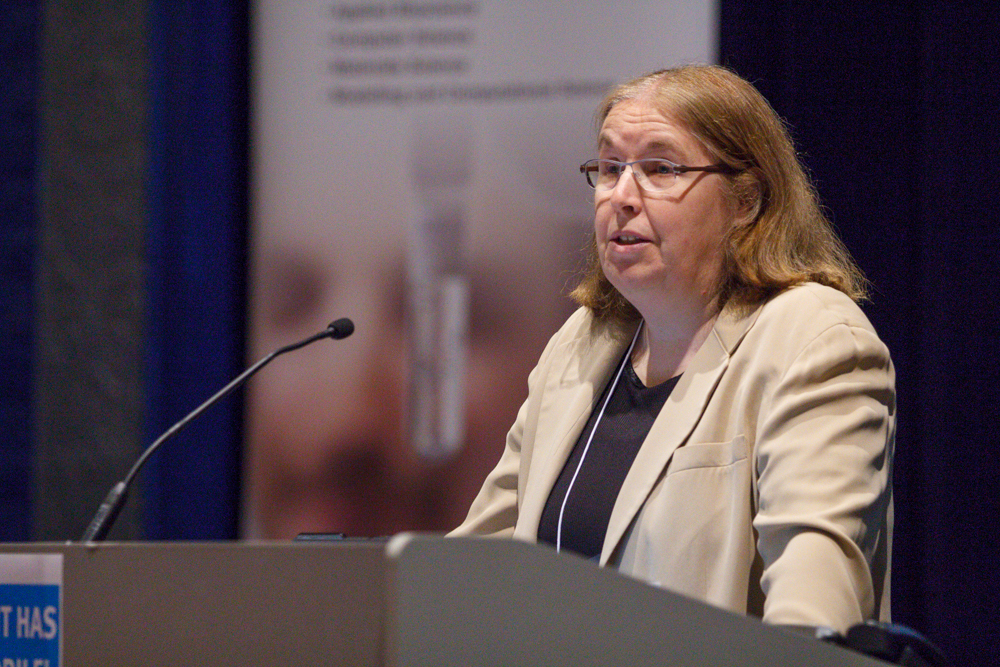
Cecilia Hageman, PhD, LLM, LLB
Adjunct Professor
Forensic Science
Faculty of Science
Forensic Science
Faculty of Science
Dr. Hageman is a forensic DNA scientist and criminal lawyer who prepares students for key role in criminal cases.
Full biography
Meticulously analyzed forensic evidence is a critical component to solving crimes; and understanding how to convey its weight in a criminal trial carries further significance in determining justice. Yet, few people specialize in both forensic science and law. Cecilia Hagemen, Ph.D., Assistant Professor of Forensic Science in the Faculty of Science, is a Criminal Lawyer and Forensic Scientist in the areas of forensic DNA analysis, bloodstain pattern analysis, serology, and body fluid identification. She has served as an expert forensic witness on more than 130 criminal cases for jury and non-jury trials in the Superior Court Justice of Ontario, trials and preliminary inquiries in the Ontario Court of Justice, and inquiries in Coroner’s Court during her career. Dr. Hagemen spent 20 years as the Assistant Section Head of Biology in the Centre of Forensic Sciences with the Ministry of Community Safety and Correctional Services in Toronto, prepping scientists to perform the role of expert witness and assessing their role in court. First appointed to UOIT in 2007, Dr. Hageman returned to the field in 2009, and served as a Sessional and Adjunct Professor until 2013 before resuming her tenure-track position. She is also an Associate Graduate Faculty member and her research aims to understand how scientific evidence is used in criminal court proceedings. Forensic Science students have the benefit of her practical, real-world expertise. Her own interests in science and law intersected early on and culminated in a Bachelor of Science in Honours Genetics from the Faculty of Science, a Bachelor of Laws from the Faculty of Law, and a Doctorate in Plant Sciences from the Faculty of Science, all at the University of Western Ontario. Subsequently, she received her Bar Admission from the Law Society of Upper Canada, and later earned her Master of Laws in Criminal Law from Osgoode Hall at York University. She serves on the Board of Directors of the Canadian Society of Forensic Science and is an Associate Member of the Law Society of Upper Canada. Highly sought after for her forensic expertise, Dr. Hageman has participated in three television productions involving cases from the Centre of Forensic Sciences, and she co-authored the DNA Handbook. Passionate about aiding those wrongly convicted, she assists the student-led Innocence Project at York University and works with the Toronto-based Association in Defence of the Wrongly Convicted, to overturn unjust convictions.
Areas of expertise
Media appearances
- Canadian Lawyer December 31, 1969Not so fast with that rapid DNAThe impact is perhaps less dramatic, but a high-tech, rapid DNA device promises to turn DNA testing — a process that often takes weeks or months from the point of extraction, mailing, receiving, inventory, and analysis — into a fully automated, hands-free procedure that wraps in less than two hours. “The idea with rapid DNA is to do what’s already done in the laboratories, but instead of sending the sample to the lab, do it right at booking [in police stations] or right at a travelling laboratory,” says Cecilia Hageman, professor of forensic science at the University of Ontario Institute of Technology. “This says we’re going to bypass the laboratory; we’re just going to put the sample in, have the profile spit out.”
- The Toronto Star December 6, 2015Why it’s so hard to keep bad forensics out of the courtroomCecilia Hageman, a professor at the University of Ontario Institute of Technology, testified in more than 100 criminal cases during the roughly 20 years she spent working as a forensic scientist at the Centre of Forensic Sciences in Toronto. She said she is “sick and tired” of DNA evidence being upheld as “the gold standard of forensics” because the condition of a sample can skew the outcome, and there can be different interpretations of the results.
- The Toronto Star December 31, 1969When fact trumps crime fiction“I think that (authors) should be up on what the labs are doing now,” says Cecilia Hageman, an assistant professor in the forensic science program at the University of Ontario Institute of Technology and former forensic biologist with the Centre of Forensic Sciences. “What was impossible yesterday is going to be possible today,” she says. Hageman also says authors should get their research from reliable sources. She suggests attending court to hear testimony from forensic scientists, pathologists and police crime scene investigators.
- Durham Region December 31, 1969Blood, fingerprints all in a day’s work at UOIT crime scene houseDr. Cecilia Hageman, an assistant forensic science professor at UOIT, looks at the macabre mess and pronounces it a “very classic pattern.” “Blood can tell you lots of things,” she says. “Most of the time it tells you DNA profiles and you’re able to make comparisons. But sometimes the question you try to answer is not who, but what happened?”
Speaking engagements
- Law Society of Upper Canada, Toronto, Ontario December 31, 1969Against All Odds – Dealing with DNA EvidenceForensic Science and Criminal Law
- Ontario Tech University, Oshawa, Ontario December 31, 1969Getting Ready for the Forensic Biology Laboratory of the FutureGraduate Student Research Conference
- Osgoode Hall Law School, York Univeristy, Toronto, Ontario December 31, 1969What is the Science of DNA? Where Are We in 2012?Canadian Symposia on DNA Forensic Evidence
- The Advocates Society, Toronto, Ontario January 4, 2011Avoiding Misunderstandings and Staying Within Your Area of ExpertiseNational Expert Witness Academy
- Toronto, Ontario December 31, 1969Expert Witness WorkshopCanadian Society of Forensic Science, Annual Conference
Affiliations
- Canadian Society of Forensic Science
- Law Society of Upper Canada
- International Association of Bloodstain Pattern Analysts


